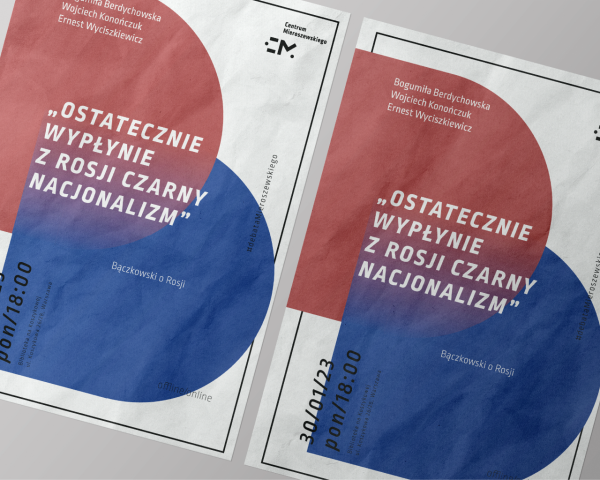Russia yesterday and today. A historical and political study | Facing history. Promethean writings | The essence of Russian strength and weakness. Journals on Russia
Prezentujemy trzytomowy zbiór pism Włodzimierza Bączkowskiego, wybitnego sowietologa i twórcy polskiej myśli wschodniej. Bączkowski był jednym z najwyraźniejszych głosów w polskich dyskusjach o polityce narodowościowej i wschodniej w latach trzydziestych XX wieku, pisarzem politycznym i analitykiem o zdolności do rozumowania chłodnego i racjonalnego.
Kamieniem węgielnym jego myślenia było przekonanie, że „Wschód jest największym zagadnieniem Rzeczypospolitej”, a jego rozwiązanie wymaga konsekwentnego działania na kilku ściśle ze sobą związanych frontach. Wiele z jego diagnoz i recept wręcz uderza aktualnością.
- Włodzimierza Bączkowskiego warto czytać dziś, dlatego że jego refleksje sprzed kilku dekad mogą nam powiedzieć o tym jak powinny wyglądać relacje Polski z naszym najbliższym sąsiadem, czyli Ukrainą. Zwłaszcza teraz, kiedy zmaga się ona z rosyjską agresją. Wiele obserwacji, refleksji, rekomendacji Włodzimierza Bączkowskiego można by było w zasadzie jeden do jednego przyłozyć do dzisiejszych relacji i wyciągnąć z nich ciekawe wnioski na to jaką politykę prowadzić, jak budować polską pozycję w regionie, ale też jak reagować na naszego wschodniego sąsiada, który napadł na Ukrainę. - powiedział Ernest Wyciszkiewicz, dyrektor Centrum Mieroszewskiego.
Tom I. Włodzimierz Bączkowski, Rosja wczoraj i dziś. Studium historyczno-polityczne
Książka Rosja wczoraj i dziś. Studium historyczno-polityczne ukazała się w lutym 1946 r. w Jerozolimie, gdy zaczynała się konfrontacja Związku Sowieckiego z Zachodem. Dokładnie w tym samym czasie George Kennan wysłał swój słynny „długi telegram”, który dał podstawę pod zimnowojenną strategię Stanów Zjednoczonych wobec Moskwy. Książka Bączkowskiego, po roku wydana także po angielsku, miała pełnić podobną funkcję – być analizą rożnych wymiarów polityki sowieckiej i summą wieloletnich przemyśleń autora o „odwiecznej Rosji”. Widział on bowiem w Związku Sowieckim odrodzenie się w nowych szatach rosyjskich tradycji imperialnych, dążeń do ekspansjonizmu terytorialnego i nacjonalizmu. Istota państwowości rosyjskiej pozostawała bowiem niezmienna, zmianie uległa jedynie jej forma.
Tom II. Włodzimierz Bączkowski, Frontem do historii. Pisma prometejskie
W tomie zebrano trzydzieści dziewięć artykułów Włodzimierza Bączkowskiego (1905–2000) o tematyce ukraińskiej i prometejskiej. Wszystkie poza trzema zostały opublikowane w latach 1933–1939, czyli w najbardziej twórczym okresie jego działalności publicystycznej. Znaczna większość wybranych tekstów ukazała się pierwotnie w „Biuletynie Polsko-Ukraińskim”, tygodniku redagowanym przez Bączkowskiego, jednym z niewielu forów otwartej dyskusji między Polakami a Ukraińcami. Kolejne teksty pochodzą m.in. z dwutygodnika „Myśl Polska”, kwartalnika „Wschód” oraz miesięcznika „Problemy Europy Wschodniej”. Trzy artykułu zostały opublikowane już po wojnie w „Kulturze” i roczniku „Niepodległość” i stanowią próbę podsumowania sprawy ukraińskiej oraz ruchu prometejskiego w II Rzeczypospolitej.
Tom III. Włodzimierz Bączkowski, Istota siły i słabości rosyjskiej. Pisma o Rosji
Publikacja zawiera dwadzieścia trzy artykuły Włodzimierza Bączkowskiego (1905–2000) opublikowane w latach 1932–1983, które reprezentatywnie pokazują, jak postrzegał Rosję i Związek Sowiecki. Pięć tekstów z tego zbioru ukazało się przed 1939 r., gdy w swojej ówczesnej działalności pisarskiej i badawczej skupiał się na kwestii ukraińskiej i prometeizmie. Pozostałe opublikował po drugiej wojnie światowej w różnych periodykach polskiej emigracji i anglojęzycznych, w tym m.in. „Sprawach Bliskiego i Środkowego Wschodu”, „Kulturze”, „Wiadomościach”, „Kurierze Polskim”, „Orbis”, „The Middle East Journal”, „The National Review”. Najważniejszym tematem Bączkowskiego była analiza rosyjskiej kultury strategicznej, istoty władzy w Rosji i jej działań międzynarodowych, w tym w szczególności wobec Polski oraz kolonializmu rosyjskiego w jego historycznym i dwudziestowiecznym wymiarze. W niewłaściwej interpretacji rzeczywistości sowieckiej oraz swoistym wishful thinking widział przyczyny błędów w ocenie Rosji, jej natury czy potencjału. Zachód bowiem nieustannie doszukiwał się w Rosji czynników odwilży, chęci dialogu, nierzadko elementów rozpadu, a Moskwa skutecznie umiała to wykorzystywać. Bączkowski bez złudzeń i do bólu realistycznie rewidował podobne podejście.
Książkę można kupić tutaj.
Na wznowienie jednej z najważniejszych, choć niemal zupełnie zapomnianych, polskich prac sowietologicznych trzeba było czekać aż siedemdziesiąt sześć lat. A jest to lektura niezmiennie aktualna, pomagająca zrozumieć również dzisiejszą Rosję.

